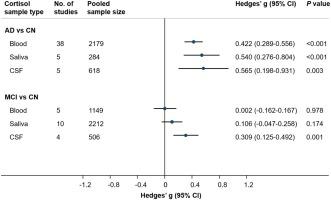Ageing Research Reviews ( IF 12.5 ) Pub Date : 2020-09-22 , DOI: 10.1016/j.arr.2020.101171 Bang Zheng 1 , Roy Tal 1 , Zhirong Yang 2 , Lefkos Middleton 3 , Chinedu Udeh-Momoh 4

|
Background
Morning cortisol levels have been reported to be elevated among patients with Alzheimer’s disease (AD); yet no meta-analysis has been conducted to confirm the existence and magnitude of this association. It also remains unclear whether hypercortisolism is a risk factor for AD.
Methods
PubMed, EMBASE, and PsycINFO were systematically searched for eligible studies. Cross-sectional data were pooled using random-effects meta-analyses; the differences in morning cortisol levels between patients and cognitively normal controls were quantified. Longitudinal studies were qualitatively synthesised due to methodological heterogeneity.
Results
17,245 participants from 57 cross-sectional studies and 19 prospective cohort studies were included. Compared with cognitively normal controls, AD patients had moderately increased morning cortisol in blood (g = 0.422, P < 0.001; I2 = 48.5 %), saliva (g = 0.540, P < 0.001; I2 = 13.6 %), and cerebrospinal fluids (g = 0.565, P = 0.003; I2 = 75.3 %). A moderate elevation of morning cortisol was also detected in cerebrospinal fluids from patients with mild cognitive impairment (MCI) versus controls (g = 0.309, P = 0.001; I2 = 0.0 %). Cohort studies suggested that higher morning cortisol may accelerate cognitive decline in MCI or mild AD patients, but the results in cognitively healthy adults were inconsistent.
Conclusions
Morning cortisol was confirmed to be moderately elevated in AD patients and may have diagnostic and prognostic values for AD.
中文翻译:

皮质醇分泌过多和阿尔茨海默病的风险:系统评价和荟萃分析
背景
据报道,阿尔茨海默病 (AD) 患者的早晨皮质醇水平升高;但尚未进行荟萃分析来证实这种关联的存在和程度。皮质醇增多症是否是 AD 的危险因素也尚不清楚。
方法
PubMed、EMBASE 和 PsycINFO 系统地搜索了符合条件的研究。使用随机效应荟萃分析汇总横断面数据;量化了患者和认知正常对照之间早晨皮质醇水平的差异。由于方法学异质性,纵向研究定性综合。
结果
纳入了来自 57 项横断面研究和 19 项前瞻性队列研究的 17,245 名参与者。与认知正常的对照组相比,AD 患者早晨血液中的皮质醇(g = 0.422,P < 0.001;I 2 = 48.5 %)、唾液(g = 0.540,P < 0.001;I 2 = 13.6 %)和脑脊液中度升高流体(g = 0.565,P = 0.003;I 2 = 75.3 %)。与对照组相比,轻度认知障碍 (MCI) 患者的脑脊液中也检测到早晨皮质醇的中度升高(g = 0.309,P = 0.001;I 2= 0.0%)。队列研究表明,早晨较高的皮质醇可能会加速 MCI 或轻度 AD 患者的认知能力下降,但在认知健康的成年人中的结果并不一致。
结论
早晨皮质醇在 AD 患者中被证实中度升高,并且可能对 AD 具有诊断和预后价值。











































 京公网安备 11010802027423号
京公网安备 11010802027423号